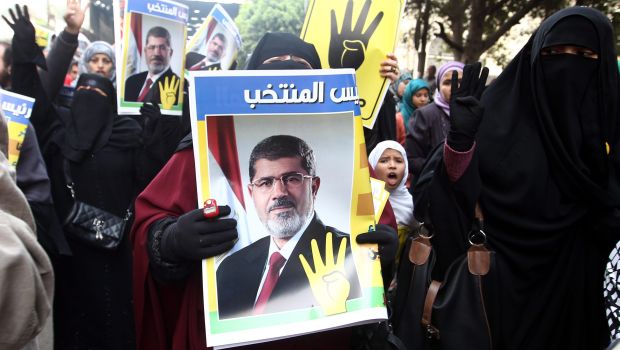
Egyptian supporters of ousted President Mohamed Morsi hold posters with photos depicting Morsi and the ‘four-fingered salute’ during a protest in Cairo, Egypt, on December 20, 2013. (EPA/KHALED ELFIQI)
Cairo, Asharq Al-Awsat—In Egypt, anything is possible—revolution and counter-revolution, trial and election, freedom and repression—or at least so goes the well-known Arabic saying.
“We have become a nation of wonders. Who would imagine Egyptians fighting Egyptians or a husband divorcing his wife over opposing political views?” asks one man at a Cairo coffee house. He is Sheikh Hamdan, an Egyptian in his 70s, who can barely believe the political and social changes that have beset his country over the past three years.
“What are you supposed to do if it is your father who has an opposing political view to you?” he wonders.
Sheikh Hamdan’s question does not go unanswered and another customer is quick to ask him: “What would you have done if you were the husband, Sheikh Hamdan?”
Quoting the Qur’an, Sheikh Hamdan retorted: “God said: ‘Live with them on a footing of kindness and equity.’ [Surat An-Nisa 4. 19]. However, propaganda and lies are bankrupt.”
The Cairo coffee house discussion was prompted by the news that an Egyptian man had referred his wife—an assistant teacher—to the country’s prosecutor-general, claiming she was a member of the Muslim Brotherhood and a supporter of terrorism. The story went viral and was immediately the subject of news reports, discussion panels and jokes.
In his official complaint, the Egyptian husband claimed that the arguments with his wife escalated over her support for the Brotherhood. He called on the prosecutor-general to “take the relevant legal action against his wife for her membership of a terrorist group, namely the Muslim Brotherhood.” He also claimed that she was inciting her students to protest against the government and was calling for the return of ousted Islamist President Mohamed Mursi. The husband concluded by saying he intended to file for divorce.
The husband’s complaint comes after Egypt’s military-backed interim government issued a decision to designate the Muslim Brotherhood as a terrorist organization, with Egypt’s Interior Ministry subsequently announcing that anyone found guilty of membership of the group, promoting its literature or taking part in Brotherhood protests would face a mandatory five-year prison sentence.
While the news that an Egyptian husband was seeking to divorce his Muslim Brotherhood wife raised eyebrows across the country, it was mostly dealt with in a lighthearted manner, inspiring headlines such as “Signs that you are married to a Muslim Brotherhood sleeper cell” and “Warning, your bed is a ticking timebomb.”
No sooner had the latest round of jokes and memes been dispensed with than well-known Egyptian cleric Mazhar Shaheen issued a controversial fatwa permitting husbands of Muslim Brotherhood wives to divorce them. Shaheen called on the men to prioritize Egypt’s national security by divorcing their “sleeping cell” wives.
Shaheen is the self-styled “preacher of the revolution” and led Friday prayers at Tahrir Square’s Omar Makram mosque before he was dismissed by Egypt’s Ministry of Religious Endowments.
“Many suffer because they find out that their wives are Muslim Brotherhood members, and there is a ‘sleeping cell’ lying beside them in the martial bed,” he said.
“If a Muslim Brotherhood wife disowns her affiliation to the group then we welcome her, but if she continues to hold terrorist views that threaten the homeland in her heart then your duty is divorce,” Shaheen added.
“She can go and live with her father,” the fatwa continued.
The controversial fatwa was denounced by Egypt’s Al-Azhar institute, which stressed that any religious edict put forward by an unlicensed preacher and not endorsed by the institute was opinion, not edict. Official fatwas can only be issued by Egypt’s Dar Al-Ifta, a religious body affiliated to Azhar.
Dar Al-Ifta established a body in January to monitor and respond to fatwas issued on TV and the Internet. It was initially established to respond to pro- Brotherhood fatwas that sow sedition in Egypt, including one calling for the assassination of Defense Minister Abdel-Fattah El-Sisi issued on January 5. But Shaheen’s flagrantly anti-Brotherhood fatwa also comes under this category.
Speaking earlier this month, Egypt’s Grand Mufti Shawqi Ibrahim Abdel-Karim Allam claimed that Dar Al-Ifta had gathered close to 320 takfirist fatwas, which brand other Muslims as apostates, and was in the process of responding to these in order to correct religious misconceptions. Allam said that these fatwas were misguided and represented a danger to post-revolutionary society.
Shaheen has lately tried to distance himself from his earlier fatwa, saying that “ideological conflict” does not merit divorce. He added: “A Muslim Brotherhood wife who brings up her children in this ideology but in a peaceful manner need not be divorced.”
But he added: “Muslim Brotherhood wives who incite against the military and police and who rejoice at the deaths of police officers and soldiers . . . must be divorced.”
Dr. Souad Saleh, an Al-Azhar University professor who presents the television program Women’s Jurisprudence said that any man who discovered that his fiancée was a member of the Brotherhood should immediately call off the wedding, and added: “God will give you better than her.”
Many Egyptian sociologists have warned against the increasing state of polarization in Egyptian society, particularly the interim government’s escalating crackdown against the Brotherhood. Political experts on both sides of the divide have warned of this Egyptian “McCarthyism,” which has seen an unprecedented number of terrorist and espionage cases being investigated and prosecuted in post-Mursi Egypt.
However Sheikh Hamdan, the Cairo coffee house regular, has not heard of McCarthyism. He said: “They have many tricks up their sleeves!”
